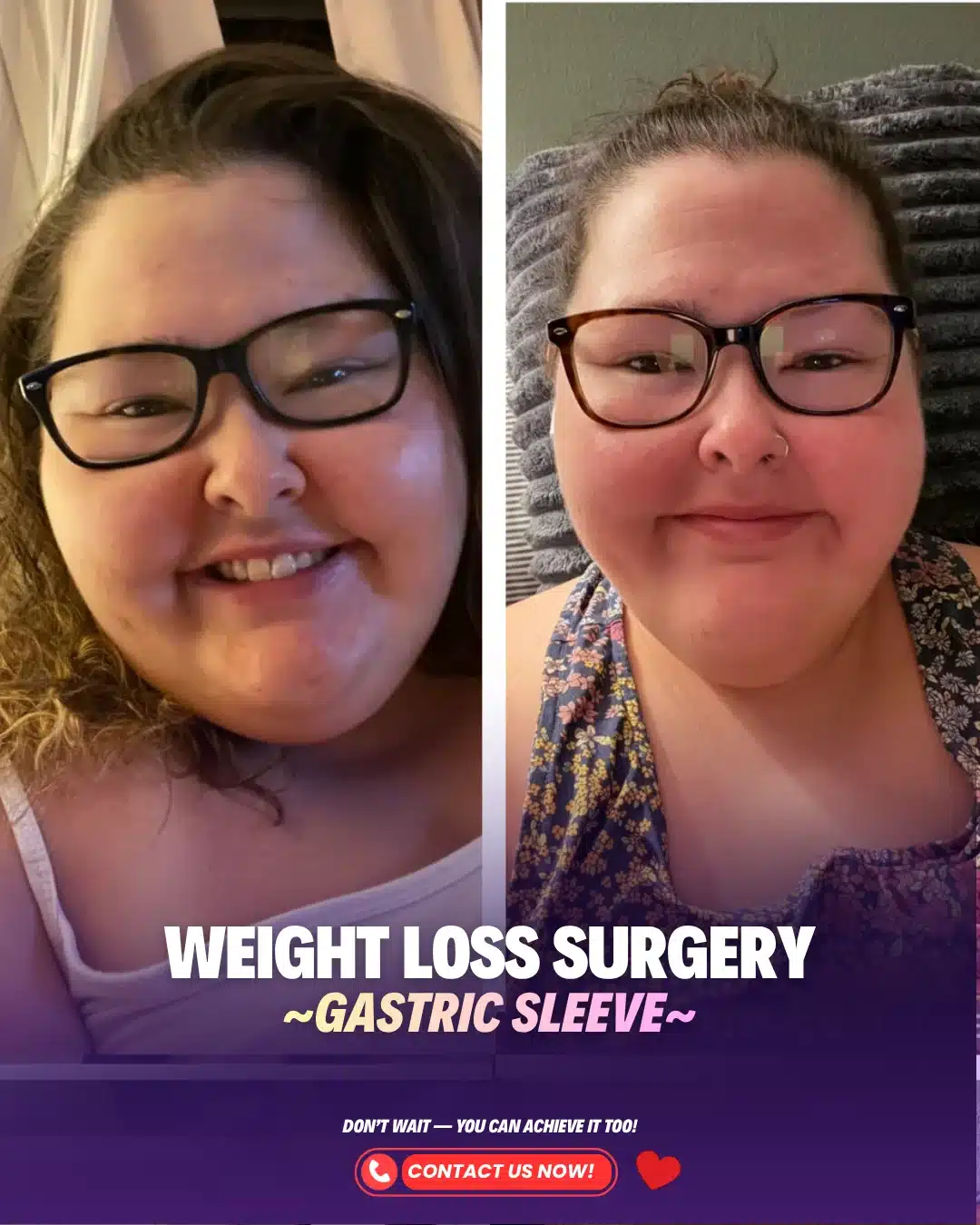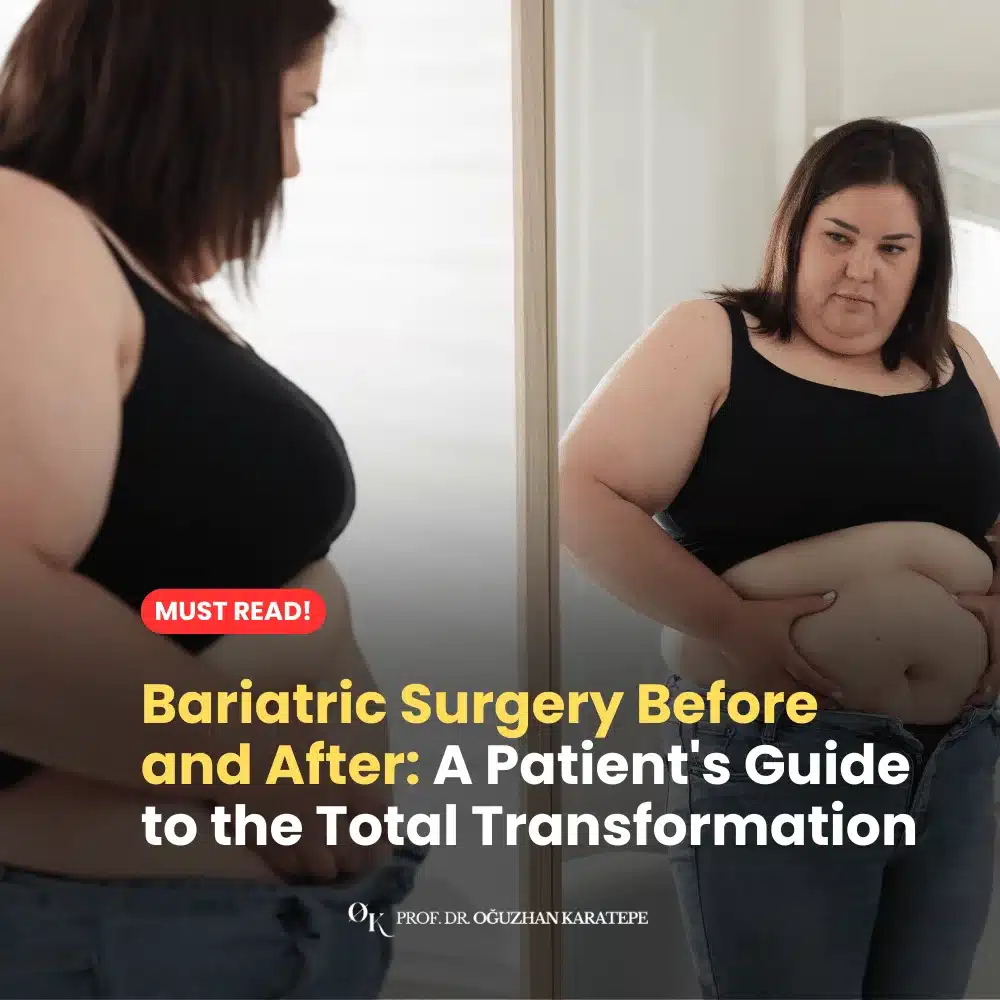Bariatric Surgery Before and After: A Patient’s Guide to the Total Transformation
Welcome to our expert guide on bariatric surgery before and after. If you are exploring weight loss surgery, seeing the “before and after” photos of other patients is likely a powerful part of your research. These transformations can be inspiring, but they only tell part of the story. The “after” is about so much more than just a number on a scale; it is a total “health gain” journey.
This page is designed to be a clear, factual, and educational resource. We will walk you through the complete bariatric surgery before and after experience—from the physical weight loss to the incredible health changes and the lifestyle adjustments you can expect. Our expert team is here to help you understand this journey and provide personalized surgical solutions for your own successful “after” story.
Free WhatsApp Consultation:
Contact us now! 👉 +90 530 489 94 74
Our patıents
Meet Some of Our Patients Who Underwent Bariatric Surgery



What Is Bariatric Surgery? A Quick Overview
Bariatric surgery is the medical “umbrella term” for a group of weight loss surgery procedures. These are not cosmetic surgeries. They are powerful, medically-proven interventions for the chronic disease of severe obesity. The most common and effective of these procedures is the Sleeve Gastrectomy (Gastric Sleeve).
These surgeries are performed laparoscopically (using “keyhole” incisions) for a faster, safer recovery. They work in two main ways:
- Restriction: The surgery makes your stomach smaller, physically limiting the amount of food you can eat in one sitting. This helps you feel full much more quickly.
- Hormonal Change: This is the most powerful part. The surgery changes your gut hormones. Specifically, it often involves removing the part of the stomach that produces ghrelin, the “hunger hormone.” With less of this hormone, your constant, nagging hunger is significantly reduced.
As a surgeon with over two decades of experience, Prof. Dr. Karatepe often explains that bariatric surgery is like resetting your body’s appetite and metabolic system, allowing it to work more efficiently for you, not against you.
What is the most common bariatric surgery?
The most common bariatric surgery performed worldwide today is the Sleeve Gastrectomy (also called the Gastric Sleeve). It has become the most popular choice because it offers excellent weight loss and health improvement with a lower risk of long-term nutritional complications compared to other procedures.
The “After”: A Health Transformation (Non-Scale Victories)
The most dramatic bariatric surgery before and after change is not just the weight loss; it is the improvement in your overall health. Many patients call these “Non-Scale Victories” (NSVs). These are the health benefits that happen when your body is no longer burdened by severe obesity.
Bariatric surgery is a powerful, metabolic procedure. For many patients, the “after” picture includes the complete remission or dramatic improvement of serious, life-threatening conditions. The goal of the surgery is to treat these diseases.
Common health improvements in the “after” phase include:
- Remission of High Blood Sugar (Type 2 Diabetes): This is one of the most profound benefits. Many gastric sleeve patients see their blood sugar levels normalize within days or weeks of surgery, often before they have even lost a significant amount of weight.
- Improved High Blood Pressure (Hypertension): Many patients are able to reduce or completely stop their blood pressure medications.
- Resolution of Sleep Apnoea: As weight comes off, the pressure on the airway is relieved. Most patients are able to stop using their CPAP machine.
- Improved Cholesterol Levels: The surgery and subsequent weight loss help to rebalance your body’s cholesterol, reducing the risk of heart attack and stroke.
- Relief from Joint Pain: Losing even a small amount of excess weight takes a massive amount of pressure off your knees, hips, and back, leading to a significant reduction in chronic pain and an increase in mobility.
The “after” is not just about looking different; it is about *feeling* different. It is about being able to walk up a flight of stairs without losing your breath, playing with your children on the floor, or fitting comfortably in an airplane seat.
How much weight will I lose after bariatric surgery?
This is a key part of the “before and after.” On average, gastric sleeve patients can expect to lose 60% to 70% of their excess body weight within the first 12 to 18 months. Your personal success depends on your starting weight and your commitment to the post-op diet and lifestyle.
Free WhatsApp Consultation:
Contact us now! 👉 +90 530 489 94 74
The “After” Reality: A Note on Loose Skin
An honest discussion about bariatric surgery before and after must include the topic of loose skin. This is not a complication; it is a very common and normal side effect of the *success* of the surgery.
When you lose a large amount of weight rapidly, your skin, which has been stretched for a long time, may not have enough elasticity to shrink back down. The amount of loose skin you will have depends on several factors that are out of your control, including:
- Your Age: Younger skin has more elasticity and tends to retract better.
- Genetics: Your genetic makeup plays a large role in your skin’s elasticity.
- Total Weight Lost: A person who loses 150 pounds (68 kg) will likely have more loose skin than someone who loses 70 pounds (32 kg).
- Smoking History: Smoking damages skin elasticity and will lead to poorer results.
It is important to have a realistic perspective. Many patients view their loose skin as a “badge of honour”—a reminder of the incredible, life-saving journey they have completed. Building lean muscle through exercise can help fill out the skin. After your weight has been stable for at least 18 months, some patients opt for plastic surgery (body contouring) to remove the excess skin. This is a personal choice, but the health benefits of the weight loss are the primary goal.
Will I definitely have loose skin after bariatric surgery?
Most patients who undergo bariatric surgery and have significant weight loss will have some amount of loose skin. The severity depends on your age, genetics, and the total amount of weight you lose. This is a common and normal side effect of successful weight loss.
Why Choose Prof. Dr. Oguzhan Karatepe for Your “After” Story?
With over 25 years of experience, thousands of successful cases, and expertise in robotic and laparoscopic surgery, Prof. Dr. Karatepe is a leading figure in gastric sleeve procedures. Your “before and after” success story begins with a safe, technically perfect surgery. Your choice of surgeon is the most important decision you will make.
A “high-volume” surgeon—one who has performed over 3,000 successful surgeries like Prof. Dr. Karatepe—is statistically proven to have lower complication rates, safer procedures, and better patient outcomes. His expertise in advanced laparoscopic and robotic surgery means your gastric sleeve is performed using the most modern, minimally invasive techniques available. This translates to a better “after” experience:
- Less post-operative pain
- A shorter and more comfortable hospital stay
- Minimal gastric sleeve scars
- A faster gastric sleeve recovery
Furthermore, as a Professor of Surgery with hundreds of academic publications, Prof. Dr. Karatepe is not just a practitioner; he is an academic authority who is at the forefront of the latest, safest techniques. Our expert team is here to help you, and we are proud to provide personalized surgical solutions at a world-class standard.
How to choose the right bariatric surgeon?
Bariatric surgery is performed by a bariatric surgeon, who is a general surgeon with specialized fellowship training in weight loss procedures. When choosing, you must look for extensive experience (1,000+ surgeries), board certification, and a surgeon who operates in an accredited (e.g., JCI) hospital.
Free WhatsApp Consultation:
Contact us now! 👉 +90 530 489 94 74

Frequently Asked Questions (FAQ) About Bariatric Surgery Before and After
Q: What is bariatric surgery?
A:Bariatric surgery is the medical term for weight loss surgery. It is a group of procedures, like the gastric sleeve, that help you lose weight by making changes to your digestive system’s size and hormones.
Q: What is a “non-scale victory”?
A: This is a positive “after” change that is not related to your weight. Examples include: stopping your blood pressure medication, no longer needing a CPAP machine for sleep apnoea, being able to cross your legs, or buying clothes in a regular store.
Q: What is the fastest weight loss period after surgery?
A: The most rapid weight loss occurs in the first 3 to 6 months. This is the “honeymoon phase” where the surgery’s restriction and hormonal effects are strongest. Weight loss continues at a slower, steady pace for 12-18 months.
Q: What will my life be like *before* the surgery?
A: The “before” phase involves a full medical evaluation to ensure you are a safe candidate. You will also be required to follow a gastric sleeve pre-op diet for 1-2 weeks. This high-protein, low-carb diet is critical for shrinking your liver to make the surgery safer.
Q: What is the diet like *after* bariatric surgery?
A: Your post-op diet is a key part of your “after.” You will follow a 4-stage plan, starting with clear liquids, then full liquids/purees, then soft foods, and finally, solid foods (around week 7). This phased approach is critical for letting your new stomach heal.
Q: Will I lose my hair after my bariatric surgery?
A: This is a common “after” side effect. Many patients (about 30-40%) experience temporary hair shedding (telogen effluvium) 3-6 months after surgery. This is a normal response to rapid weight loss and is not permanent. It is minimized by hitting your protein and vitamin goals.
Q: Will I have large scars after bariatric surgery?
A: No. Because the surgery is laparoscopic, you will have 3-5 very small gastric sleeve scars (each about 1-1.5 cm). These fade significantly over time and are easily hidden. This is a major “pro” of modern weight loss surgery.
Q: Can I get pregnant after bariatric surgery?
A: Yes! This is a major “after” benefit for many women. Bariatric surgery often *improves* fertility. It is strongly recommended to wait 12-18 months after surgery, once your weight is stable, before trying to conceive.
Q: Will I be able to eat “normal” food again after?
A: Yes. After you are fully healed, you can eat most “normal” healthy foods, just in much smaller portions. Your new life will be focused on “protein first.” You will likely have to limit or avoid high-sugar, high-fat, or “doughy” foods, as they may cause discomfort.
Q: Can I regain weight after bariatric surgery?
A: Yes. This is a critical part of the “after” journey. The surgery is a powerful tool, not a magic cure. If a patient does not follow the new lifestyle and “grazes” on high-calorie “slider foods” (like ice cream, crisps, or chocolate), it is possible to regain weight after 2-5 years. Long-term follow-up is key.
Q: What is a “weight loss stall”?
A: This is a very common and normal part of the “after” journey. It is a period of days or weeks where the scale does not move. This is your body adjusting. The best way to break a stall is to trust the process, focus on your protein intake, stay hydrated, and increase your activity.
Q: What is the recovery time like?
A: The gastric sleeve recovery time is fast. Most patients stay in the hospital for 2-3 nights and can return to a desk job or light activities in 2 to 4 weeks.
Legal Disclaimer
This information is for general educational purposes only and is not a substitute for professional medical advice. For personalized treatment plans, please contact Prof. Dr. Oguzhan Karatepe directly.
Contact Us Today
Our expert team in bariatric surgery is ready to assist you. If you are ready to start your own “before and after” journey or wish to schedule a consultation, please reach out to us.
Free WhatsApp Consultation:
Contact us now! 👉 +90 530 489 94 74
How can I book an appointment?
You can contact us directly via phone, WhatsApp, or by filling out the online contact form on our website. Our dedicated patient coordinators will be happy to schedule your free, no-obligation consultation.
